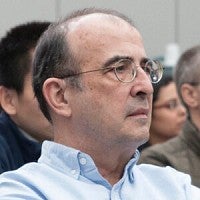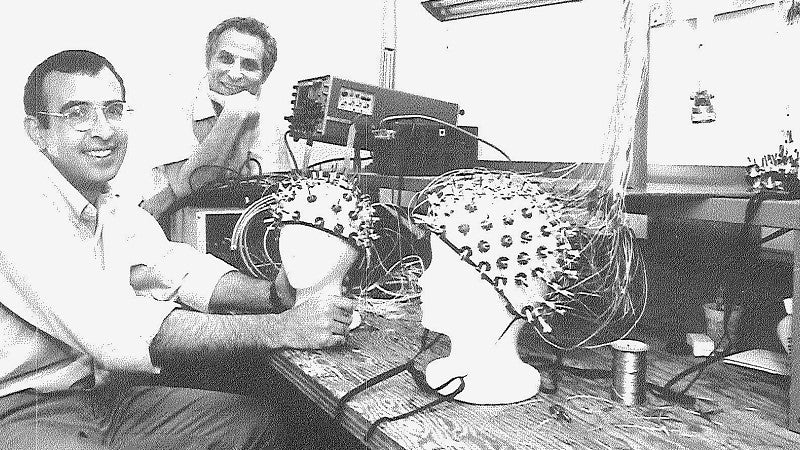You could call it a thinking cap, but Don Tucker's signature invention is really meant to capture brain waves, not inspire them.
Tucker is a UO professor and inventor of the geodesic sensor net, a device that vastly simplified and improved the way researchers see and measure brain activity. It was such a revolutionary advancement that Tucker recently was named a fellow of the National Academy of Inventors, becoming the first UO faculty member ever to receive the honor.

“Throughout his long and productive career, Professor Tucker has shown incredible determination and commitment to his work, both as a researcher and as an entrepreneur,” said David Conover, vice president for research and innovation. “He epitomizes the perseverance required of inventors to see their work successfully commercialized, and we congratulate him on this much-deserved honor.”
Tucker is the first UO faculty member to be named a fellow of the National Academy of Inventors and the third inductee from Oregon. The UO formed its chapter of the academy in 2017 to promote more entrepreneurship and innovation within the university.
The UO’s Innovation Partnership Services unit, which works with UO innovators, the public and industry to accelerate the adoption of innovations derived from UO research and education, nominated him for his many accomplishments. Tucker produced a number of key patents in support of EGI’s commercialization, said Chuck Williams, associate vice president for innovation.
“As an inventor, taking the time to patent and make the investment was an important part of his success,” Williams said. “He has proven that basic science coming out of the UO has relevance in the health care field. In addition to becoming one of the largest bioscience and health tech companies in the region, EGI has also helped to train countless students, providing them with real-world experience during their time at the UO and hiring many of them after graduation.”
For his part, Tucker said he was pleased to be recognized as a National Academy of Inventors Fellow and especially pleased to have been nominated by the UO.
“I was shocked to learn about the award,” Tucker said. “It was an honor was to be nominated by my university. It’s great that the NAI elected me, but the recognition by the UO means the most.”

Reflecting on how far the company he founded has come, he pointed to the widespread use of the geodesic sensor net and other electrophysiological technologies. More than 5,000 scholarly articles have been written involving science conducted with the technology, Tucker said.
“My colleagues and I were able to create new tools for measuring human brain activity that are now used in 1,000 labs worldwide,” Tucker said. “Just keeping up with the scientific publications of these labs is really challenging. I’m pleased to contribute to the remarkable creativity of these scientists.”
Tucker has been a faculty member in the UO Department of Psychology since 1984. He founded the Brain Electrophysiology Laboratory in the basement of Straub Hall. The lab went on to develop new technologies for brain mapping, including the geodesic sensor net. In 1992 he founded Electrical Geodesics Inc..
Over the next several decades, EGI continued to bring innovative methods to brain research laboratories. Tucker and other EGI scientists collaborated on new developments with UO colleagues in the Neuroinformatics Center on research projects funded by the U.S. Telemedicine and Advanced Research Command, the Defense Advanced Research Projects Agency and the National Geospatial Intelligence Agency.
“The commercialization of research technology has always been a key mission of the Neuroinformatics Center, with a specific focus on bringing high-performance computing to allow advanced methods for measuring and analyzing human brain activity,” Tucker said.
In 2017 Philips purchased EGI and made this the base for the Philips Neuro division.
Tucker founded the BEL Company later that year. Today he serves as CEO and chief scientist of the company. The BEL Company continues to be a center for experimentation, research and the invention of new technologies.
Tucker continues to use high-performance computing to examine the brain’s electrical activity. In recent years, he and his associates have explored new ways of using electrical fields to manipulate brain activity as well. New insights in these areas are furthering the understanding of sleep disorders, seizures, memory and emotion.
In being named a 2018 National Academy of Inventors Fellow, Tucker joins a select group of recipients. This year’s class includes three Nobel Laureates, two inductees of the National Inventors Hall of Fame and 59 members of the National Academies of Sciences, Engineering, and Medicine, among other awards and distinctions. The 2018 fellows are named inventors on nearly 4,000 U.S. patents.
The National Academy of Inventors is a member organization of universities and research institutes founded to support entrepreneurship and drive industry and research forward. The academy’s fellowship is the highest professional distinction accorded to academic inventors who have demonstrated “a prolific spirit of innovation in creating or facilitating outstanding inventions that have made a tangible impact on quality of life, economic development and the welfare of society.”
Tucker and the rest of the class of 2018 will be inducted at the Space Center Houston in April at the eighth annual meeting of the inventors academy.
—By Lewis Taylor, University Communications


